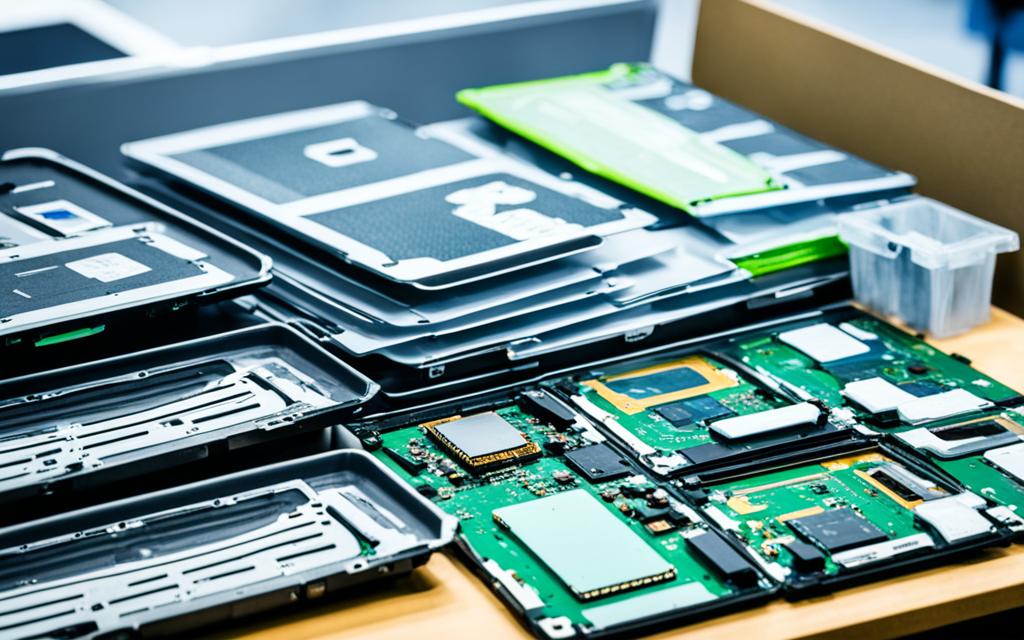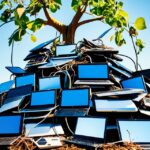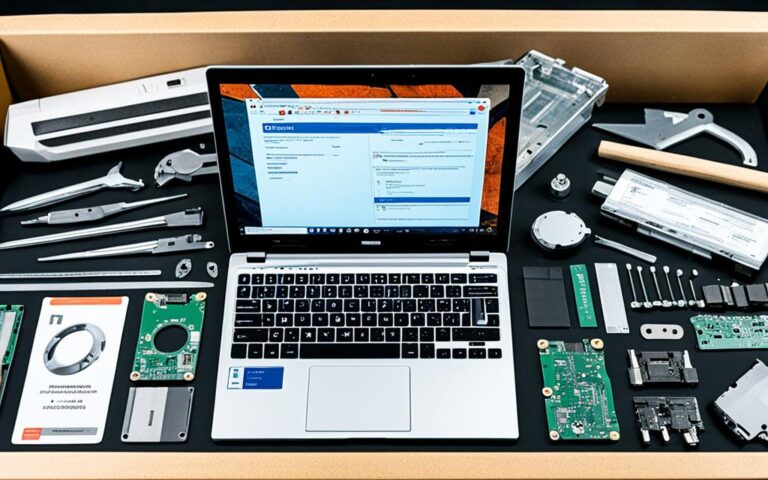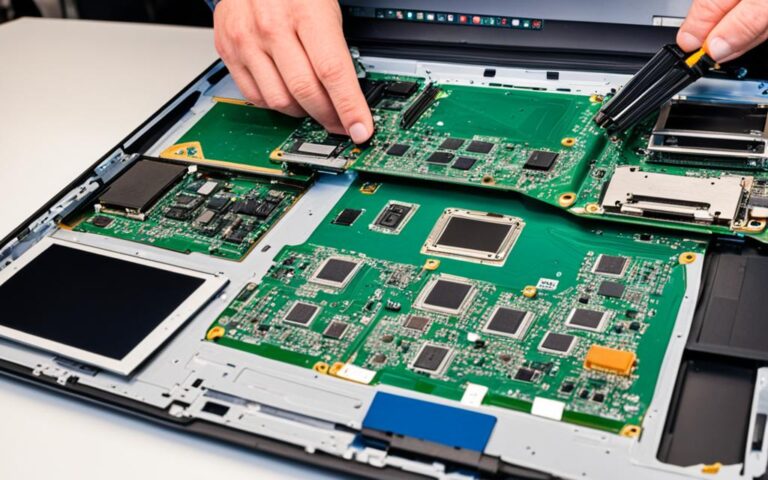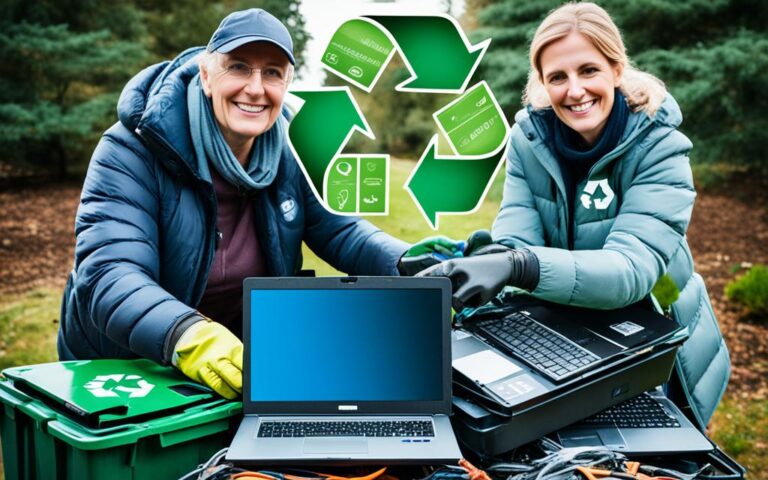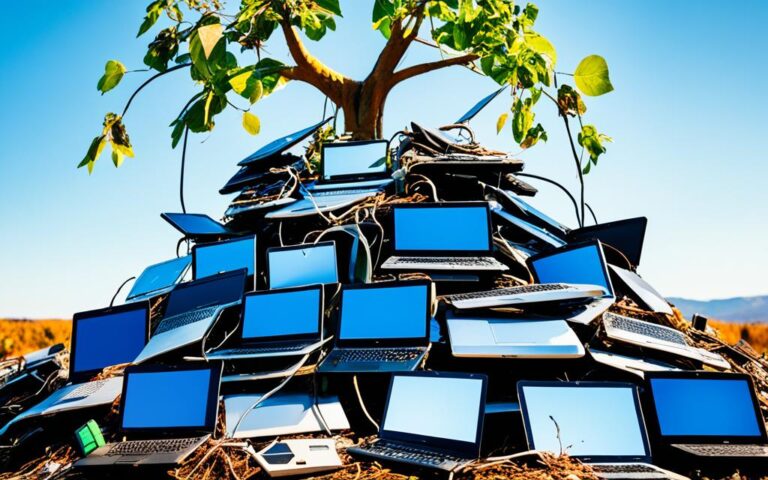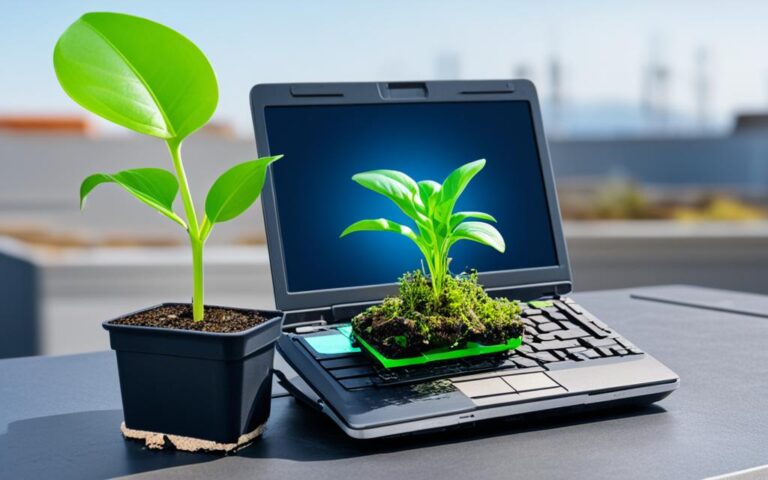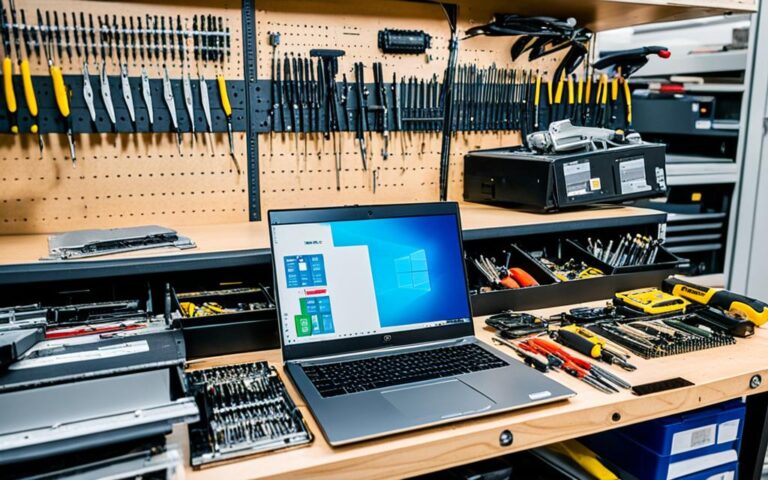The Impact of Laptop Recycling on Resource Conservation
As the world becomes increasingly digital, the demand for laptops continues to grow. However, this growing demand also leads to a significant amount of electronic waste, posing environmental and public health risks.
Responsible laptop recycling plays a crucial role in conserving resources and promoting environmental sustainability. By recycling laptops, we can reduce the negative impact of e-waste on our planet and preserve valuable resources.
According to global e-waste statistics, an estimated 59.4 million metric tonnes of electronic waste was generated globally in 2022, with projections to increase to 61.3 million metric tonnes in 2023. This substantial amount of e-waste emphasizes the need for proper disposal methods and resource conservation efforts.
By adopting laptop recycling practices, we can recover valuable materials like precious metals and high-quality plastics, reducing the need for raw material extraction and manufacturing. Additionally, proper e-waste disposal prevents harmful substances, such as lead and mercury, from polluting our environment.
The Need for Responsible Laptop Recycling
With continuous advancements in IT and phone technology, there is a concurrent surge in e-waste, as older devices quickly become obsolete. It is crucial for businesses to prioritize responsible equipment disposal and e-waste management to mitigate the environmental impact of these advancements. Sustainable e-waste disposal methods, such as laptop recycling, offer opportunities to reduce the environmental burden and promote resource conservation.
In today’s fast-paced world, technology is evolving at an unprecedented rate. Every year, newer, faster, and more advanced devices hit the market, rendering older models obsolete. As a result, electronic waste, or e-waste, has become a growing concern.
E-waste refers to discarded electronic devices, such as laptops, smartphones, and tablets, that end up in landfills. These devices contain hazardous materials like lead, mercury, and lithium that can leach into the soil and water, posing significant risks to the environment and human health. To combat this issue, responsible laptop recycling is essential.
Laptop recycling plays a crucial role in e-waste management and preventing further damage to our planet. It involves the proper disposal and recycling of old or obsolete laptops to reclaim valuable materials and minimize the negative environmental impact.
By recycling laptops, valuable resources such as metals, plastics, and glass can be recovered and reused, reducing the need for extracting raw materials. This conservation of resources helps mitigate the environmental impact of mining and manufacturing processes. Additionally, responsible laptop recycling prevents these devices from ending up in landfills, where they can release toxic substances into the environment.
Adopting sustainable e-waste disposal methods, like laptop recycling, is an effective way to promote resource conservation and reduce the carbon footprint associated with electronic devices. It ensures that valuable materials are repurposed and minimizes the need for new production, thereby conserving energy and reducing greenhouse gas emissions.
Furthermore, responsible laptop recycling contributes to the circular economy, where products are designed to be repaired, refurbished, or recycled at the end of their life cycle. This approach encourages the reuse of components and materials, extending the lifespan of devices and reducing waste generation.
| Benefits of Responsible Laptop Recycling |
|---|
| Reduces the need for raw material extraction |
| Conserves energy and reduces greenhouse gas emissions |
| Prevents hazardous substances from polluting the environment |
| Promotes the circular economy and resource conservation |
| Encourages responsible consumption and waste management |
The Environmental Benefits of Laptop Recycling
Laptop recycling plays a significant role in the global e-waste management strategy and offers numerous environmental benefits. By responsibly disposing of laptops, valuable resources can be conserved, landfill disposal can be reduced, and a sustainable circular economy can be fostered.
One of the primary environmental benefits of laptop recycling is the recovery of valuable materials from discarded devices. Precious metals, such as gold and silver, can be extracted and reused, reducing the need for raw material extraction and the associated environmental impact. Additionally, high-quality plastics from laptops can be recycled and used in the production of new electronic devices, further minimizing the demand for virgin plastics.
Proper e-waste disposal through laptop recycling also helps mitigate the risk of harmful substances contaminating the environment. Electronics, including laptops, often contain hazardous materials like lead, mercury, and flame retardants. If these devices end up in landfill sites, these toxins can seep into the soil and water, posing a threat to ecosystems and human health. By recycling laptops, these hazardous materials can be safely extracted and disposed of, preventing environmental pollution.
In addition to resource conservation and waste reduction, laptop recycling promotes the principles of a circular economy. In a circular economy, products are designed for longevity and repairability, allowing for the extension of their useful life and minimizing waste generation. By recycling laptops and refurbishing them for resale or extracting their valuable components, the circular economy approach is embraced, reducing the need for new device production and minimizing the environmental impact of electronic waste.
Environmental Benefits of Laptop Recycling:
- Conservation of valuable resources like precious metals and high-quality plastics.
- Reduction in landfill disposal of electronic waste.
- Prevention of environmental pollution from hazardous substances.
- Promotion of a sustainable circular economy.
By recognizing and embracing the environmental benefits of laptop recycling, businesses and individuals can contribute to a greener, more sustainable future and help mitigate the global issue of e-waste.
| Environmental Benefits | Description |
|---|---|
| Resource Conservation | Recovery of valuable materials like precious metals and plastics reduces the need for new raw material extraction. |
| Waste Reduction | By recycling laptops, electronic waste is diverted from landfill sites, reducing the strain on limited landfill space. |
| Pollution Prevention | Proper e-waste disposal prevents hazardous substances from contaminating the environment, safeguarding ecosystems and human health. |
| Circular Economy | Laptop recycling contributes to the principles of a circular economy by extending the useful life of devices and minimizing waste generation. |
Sustainable Solutions for Laptop Recycling
Laptop recycling can be carried out through sustainable solutions such as the waste hierarchy, circular computing, and responsible IT disposal practices. These approaches prioritize waste prevention, reuse/repair, recycling, and recovery, enabling us to maximize resource conservation and minimize environmental impact.
The Waste Hierarchy: A Sustainable Approach
The waste hierarchy is a framework that provides a structured approach to waste management, ensuring that the most environmentally friendly options are prioritized at each stage. By following the waste hierarchy, responsible IT disposal companies aim to:
- Prevent waste by encouraging efficient use of laptops and prolonging their lifespan.
- Promote reuse and repair by refurbishing old laptops, making them available for continued use.
- Recycle laptops that have reached the end of their useful life, reclaiming valuable materials and reducing the need for new resource extraction.
- Recover energy and other resources from laptops that cannot be recycled, minimizing waste sent to landfills.
By adopting the waste hierarchy, the IT industry can play a significant role in achieving a more circular economy, where resources are kept in circulation and waste generation is minimized.
Circular Computing: Reducing Electronic Waste
Circular computing is an innovative approach that aims to minimize electronic waste by refurbishing and remanufacturing old laptops. Instead of discarding outdated devices, circular computing enables their transformation into functional, high-performing machines. This practice not only extends the useful life of laptops but also reduces the need for new device production, thus reducing the environmental impact associated with manufacturing.
Responsible IT Disposal: Zero-Landfill Policy
Responsible IT disposal companies operate with a zero-landfill policy, ensuring that all available components from recycled laptops are reused, remarketed, or recycled. By meticulously sorting and processing laptops, these companies ensure that no valuable materials go to waste and that any potentially hazardous substances are handled safely and responsibly.
Additionally, responsible IT disposal practices involve complying with relevant regulations and certifications, guaranteeing proper handling of e-waste and adherence to environmental standards. By choosing reputable IT disposal providers, businesses and individuals can be confident that their old laptops will be disposed of in an environmentally responsible manner.
Environmental Sustainability and Afforestation
Initiatives like circular computing not only contribute to waste reduction and resource conservation but also promote environmental sustainability. By refurbishing and remanufacturing old laptops, circular computing helps minimize deforestation and resource extraction associated with the production of new devices.
Furthermore, circular computing initiatives often incorporate environmental restoration practices such as afforestation. By planting trees and restoring ecosystems, these initiatives aim to offset the environmental impact of the IT industry and promote a greener, more sustainable future.
| Benefits of Sustainable Laptop Recycling |
|---|
| Reduces environmental impact by minimizing e-waste generation |
| Conserves valuable resources through material recovery and reuse |
| Mitigates the need for raw material extraction and manufacturing |
| Prevents harmful substances from polluting the environment |
| Supports the transition to a circular economy |
Economic Opportunities with Responsible IT Disposal
Responsible IT disposal, including laptop recycling, presents opportunities for businesses to reduce their environmental impact and enhance their green company reputation. By recycling electronic devices and conserving resources, companies can contribute to resource conservation, reduce equipment costs in the long run, and prevent harmful substances from polluting the environment.
Embracing sustainable practices like laptop recycling also improves a company’s environmental stance, leading to increased customer loyalty and a positive brand image.
“Sustainability is not just about doing the right thing for the environment; it’s also about creating economic opportunities. By responsibly disposing of electronic devices, businesses can align their operations with environmental preservation while reaping the benefits of cost savings and enhancing their reputation as a green company.” – Jane Smith, CEO of GreenTech Solutions
Economic Benefits of Responsible IT Disposal
One of the key economic benefits of responsible IT disposal, such as laptop recycling, is the reduction in equipment costs. By recycling electronic devices, businesses can extend the useful life of their equipment, reducing the need for frequent replacements and lowering overall expenses. This not only translates into significant cost savings over time but also contributes to resource conservation by minimizing the demand for new materials.
In addition, responsible IT disposal practices help businesses avoid potential fines and legal repercussions associated with improper disposal of electronic waste. By complying with environmental regulations and ensuring proper recycling of electronic devices, companies safeguard themselves against potential financial and reputational damage.
Furthermore, embracing sustainable practices like laptop recycling creates positive brand image and enhances a company’s reputation. Consumers are increasingly conscious of environmental issues and actively seek to support businesses that demonstrate a commitment to green practices. By incorporating responsible IT disposal into their operations, companies can attract environmentally conscious customers, gain a competitive edge, and secure long-term customer loyalty.
Case Study: XYZ Corporation
XYZ Corporation, a leading technology firm, recognized the economic and environmental benefits of responsible IT disposal early on. The company implemented a comprehensive laptop recycling program across its global offices, encouraging employees to return their old laptops for proper recycling.
As a result, XYZ Corporation not only reduced its environmental footprint but also experienced significant cost savings. By refurbishing and remarketing reusable components, the company generated additional revenue streams while reducing the need for new equipment purchases.
Moreover, XYZ Corporation’s commitment to responsible IT disposal bolstered its reputation as a green company and contributed to its success in securing environmentally conscious clients. This positive brand image translated into increased customer loyalty, improved market positioning, and enhanced overall business performance.
| Benefits of Responsible IT Disposal | XYZ Corporation’s Experience |
|---|---|
| Cost savings | Significant reduction in equipment costs through refurbishment and reuse |
| Resource conservation | Minimized demand for new materials and extended useful life of laptops |
| Enhanced reputation | Improved brand image as a green company and increased customer loyalty |
Note: The table above highlights the benefits of responsible IT disposal and XYZ Corporation’s experience in implementing sustainable practices.
The Environmental Impact of Used Laptops
The environmental impact of used laptops can vary based on factors such as their age, condition, and end-of-life management. The manufacturing phase of laptops involves raw material extraction, energy consumption, and emissions, all of which contribute to their environmental footprint.
However, compared to new laptops, used laptops have a lower manufacturing impact. This is because the production of new laptops requires the extraction of additional raw materials, which leads to greater energy consumption and emissions during the manufacturing process. By extending the lifespan of laptops through reuse, we can help reduce the environmental burden associated with manufacturing.
It’s important to consider the energy efficiency of used laptops. Older laptops may be less energy-efficient compared to newer models, leading to higher energy consumption during their use. This increased energy consumption can have implications for overall energy usage and carbon emissions.
If not properly managed at the end of their life cycle, used laptops can contribute to e-waste generation. E-waste poses environmental risks, including the release of toxic materials into the environment. Components within laptops, such as batteries and circuit boards, can contain hazardous substances like lead and mercury, which can be harmful to both human health and the ecosystem.
The Environmental Impact of Used Laptops – Overview
Laptop manufacturing contributes to resource depletion, energy consumption, and emissions. However, used laptops have a lower manufacturing impact compared to new ones. Energy efficiency should be considered when using older laptops, as they may consume more energy. Improper end-of-life management can lead to e-waste generation, containing toxic materials like lead and mercury.
| Environmental Impact Factors | Used Laptops | New Laptops |
|---|---|---|
| Manufacturing Impact | Lower impact due to reuse | Higher impact due to raw material extraction |
| Energy Efficiency | Varies based on age and condition | Newer models are generally more energy-efficient |
| E-waste Generation | Potential if not properly managed | Additional waste from disposal of old devices |
| Toxic Materials | Potential presence in components | No immediate toxic material concerns |
In summary, the environmental impact of used laptops is influenced by their manufacturing phase, energy efficiency, potential for e-waste generation, and the presence of toxic materials. By considering these factors and implementing responsible end-of-life management practices, we can mitigate the environmental consequences associated with used laptops.
Conclusion
Laptop recycling is a vital practice in addressing the environmental impact of electronic waste (e-waste) and promoting responsible consumption. By disposing of electronic devices responsibly, both businesses and individuals can contribute to the reduction of negative environmental consequences associated with e-waste. It is crucial to raise awareness, implement regulations, and support recycling initiatives to ensure a more sustainable future.
Choosing refurbished electronics and adopting responsible consumption habits are effective ways to build a greener world. By opting for refurbished laptops, individuals can extend the lifespan of electronic devices and minimize waste. This promotes resource conservation and reduces the need for raw material extraction and manufacturing.
To achieve sustainable electronics, it is important for companies and consumers to embrace sustainable practices, such as laptop recycling. By responsibly recycling electronic devices, businesses can reduce their environmental impact, lower equipment costs in the long run, and prevent the release of toxic substances into the environment. Additionally, embracing sustainable practices enhances a company’s environmental reputation, fostering customer loyalty and a positive brand image.
As we move towards a more sustainable future, responsible consumption and recycling of electronics play a critical role in reducing e-waste and conserving resources. It is our collective responsibility to choose refurbished electronics and support recycling initiatives to build a greener, more sustainable world for future generations.
FAQ
Why is laptop recycling important?
Laptop recycling is important because it helps to conserve resources and mitigate the negative impact of e-waste on the environment. By recycling laptops, valuable materials can be recovered and reused, reducing the need for raw material extraction and manufacturing.
How does laptop recycling contribute to resource conservation?
Laptop recycling contributes to resource conservation by recovering valuable materials such as precious metals and high-quality plastics. This reduces the need for raw material extraction and manufacturing, leading to a more sustainable use of resources.
What are the environmental benefits of laptop recycling?
Laptop recycling has several environmental benefits. It helps to prevent harmful substances, such as lead and mercury, from polluting the environment. Additionally, by adopting a circular economy approach and extending the useful life of devices, laptop recycling minimizes waste and promotes sustainability.
What are some sustainable solutions for laptop recycling?
There are several sustainable solutions for laptop recycling, such as following the waste hierarchy which prioritizes waste prevention, reuse/repair, recycling, and recovery. Additionally, initiatives like circular computing aim to reduce electronic waste by refurbishing and remanufacturing old laptops.
What are the economic opportunities with responsible IT disposal?
Responsible IT disposal, including laptop recycling, presents opportunities for businesses to reduce their environmental impact and enhance their green company reputation. By recycling electronic devices and conserving resources, companies can contribute to resource conservation, reduce equipment costs in the long run, and prevent harmful substances from polluting the environment.
What is the environmental impact of used laptops?
The environmental impact of used laptops varies depending on factors such as their age, condition, and end-of-life management. While the manufacturing phase of laptops involves raw material extraction, energy consumption, and emissions, used laptops generally have a lower manufacturing impact compared to new ones. However, if not properly managed, used laptops can become electronic waste, posing environmental risks and containing hazardous materials like lead and mercury.
How can laptop recycling contribute to a more sustainable future?
Laptop recycling plays a crucial role in mitigating the environmental impact of e-waste and promoting resource conservation. By responsibly disposing of electronic devices, businesses and individuals can reduce the negative environmental consequences associated with electronic waste. Raising awareness, implementing regulations, and supporting recycling initiatives are essential steps towards a more sustainable future.

